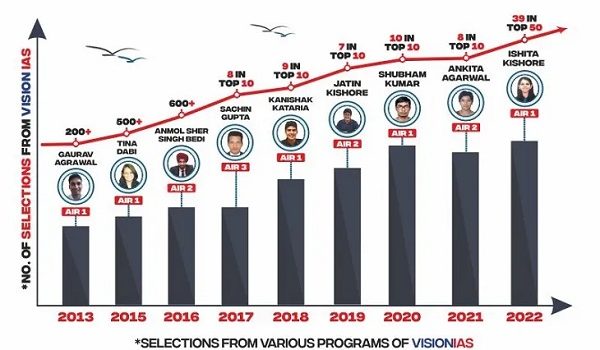The UPSC Civil Services Examination is one of the most coveted and challenging exams in the country. Success in this exam brings immense professional and personal satisfaction. It requires not just knowledge and skills, but also personality traits suitable for a career in Civil Services. Hard work, determination, and perseverance are essential, but the journey often involves overcoming loneliness, immense competition pressure, anxiety, and other psychological challenges. Unfortunately, mental well-being is often overlooked, which can detrimentally affect academic performance and physical health.
The Importance of Mental Health in UPSC Preparation
Mental health is as crucial as academic preparation in the UPSC journey. Stress, anxiety, and other psychological issues can hinder a student’s ability to perform well. Here are additional points to consider:
- Holistic Development: UPSC aspirants need to develop not just academically but also emotionally and psychologically. Mental health practices, such as mindfulness and resilience training, contribute to this holistic development.
- Long-Term Benefits: Mental well-being practices adopted during UPSC preparation can benefit students throughout their careers. Techniques like CBT, time management, and stress relief can be valuable tools in professional life.
- Creating a Support Network: Encouraging students to build a support network of friends, family, and mentors can provide emotional and psychological support throughout their preparation. A strong support network offers encouragement, advice, and a sense of community.
- Mindfulness and Relaxation Techniques: Incorporating mindfulness practices and relaxation techniques such as yoga, meditation, and deep breathing exercises can help manage stress levels.
- Balancing Life and Studies: Striking a balance between academic demands and personal life is crucial. Ensuring time for relaxation, hobbies, and social interactions can prevent burnout and promote sustained effort.
Professional Help and Self-Care
- Understanding the Need for Professional Help: Professional counselors can provide strategies and tools tailored to individual needs. They help students understand their stressors and work through them effectively.
- Self-Care Practices: Encourage students to engage in self-care activities like regular exercise, healthy eating, adequate sleep, and hobbies. Self-care is essential for maintaining mental well-being and preventing stress-related issues.
- Regular Mental Health Check-Ins: Just like physical health check-ups, regular mental health check-ins with a counselor can help identify and address issues before they become severe.
- Developing Resilience: Building resilience helps students cope with setbacks and challenges. Resilience training can include stress management techniques, problem-solving skills, and developing a positive outlook.
VisionIAS: Supporting Your Mental Wellness
At VisionIAS, we recognize the multifaceted nature of this journey. To support our students comprehensively, we have established a dedicated Student Wellness Cell. Since April 2024, our highly professional psychologists and experienced professionals have provided confidential and mindful support to students requiring mental health support. Our goal is to ensure that every student has the mental strength to achieve success.
- Enhancing Academic Performance: Effective stress management contributes to better academic outcomes. By addressing mental health, students can improve their concentration, memory, and overall performance.
- Professional Mental Health Support: Seeking professional help is crucial for success in UPSC preparation. Our psychologists use evidence-based techniques to help students manage stress, anxiety, and other challenges.
- Well-Supported Mind for Excellence: Mental well-being is essential for achieving success in UPSC exams. A clear, focused mind can absorb information better and think critically during exams.
- Comprehensive Wellness Cell: We address various issues impacting mental health and academic performance, ensuring that students receive holistic support. Our services tackle a wide range of psychological challenges.
- Safe and Non-Judgmental Environment: We provide a space for students to discuss issues and receive personalized support without fear of judgment.
- Confidential and Structured Support: Our sessions are structured based on the severity of the issues, ensuring thorough and effective support. Confidentiality is a cornerstone of our counseling services.
Common Issues and Their Resolutions
Our counseling services have addressed a variety of issues, including:
- Anxiety and Hopelessness: Using Cognitive Behavioural Therapy (CBT) to promote positive thinking and reframe negative thoughts.
- Lack of Motivation and Focus: Introducing time management strategies and SMART goal-setting to enhance productivity.
- Emotional Struggles: Providing a safe space for expression and techniques such as journaling and progressive muscle relaxation to manage stress and anxiety.
- Social Isolation and Loneliness: Encouraging healthy social interactions and setting personal boundaries to balance life and studies.
- Family and Personal Issues: Offering advice on coping with family dynamics, personal loss, and significant life stressors.
Expanding Our Reach: Open to All Students
Recognizing the importance and potential impact of these services, VisionIAS is now extending our counseling and wellness support to all students preparing for UPSC CSE, regardless of their coaching institute affiliation or regional backgrounds. You can schedule a session by visiting our front-end office at the Apsara Arcade building near Karol Bagh Metro Station or by emailing us at student.wellness@visionias.in.
Join Us in Ensuring Your Well-Being
We are committed to supporting the student community throughout the UPSC journey, providing the necessary tools and guidance to help you overcome both academic and non-academic challenges. Together, let’s ensure your mental well-being and success.
The journey to cracking the UPSC Civil Services Examination is demanding and can be fraught with various challenges. Mental well-being is a critical component of success in this journey. VisionIAS is dedicated to providing comprehensive mental health support to all students, ensuring they are well-prepared not just academically, but also emotionally and psychologically. By prioritizing mental health, students can enhance their academic performance, build resilience, and achieve their goals.
Remember, seeking help is a sign of strength, not weakness.
Visit us at: https://visionias.in/
Or Contact us at: student.wellness@visionias.in
Or Call us at: 8468022022, 9019066066



